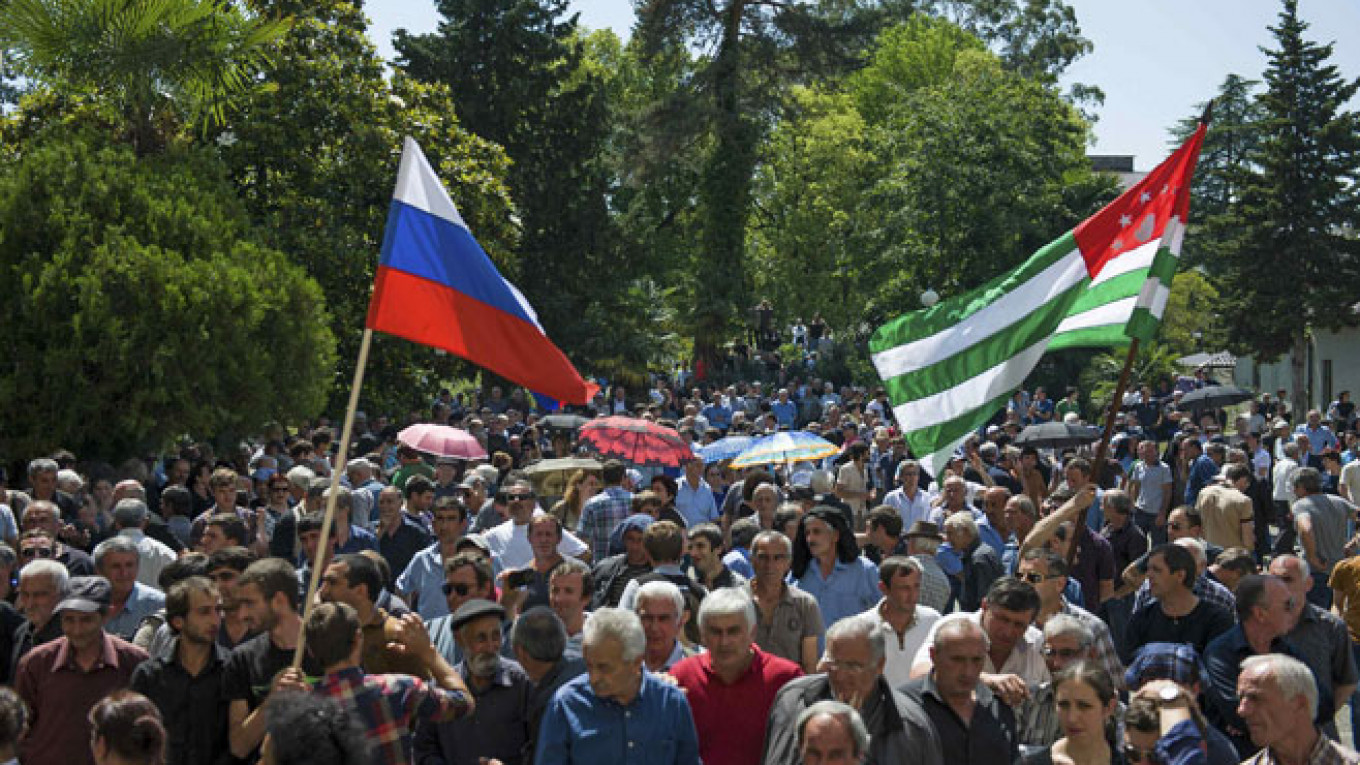In the direct aftermath of a political uprising that threatened to destabilize Abkhazia, Russia demonstrated its role as the ultimate arbiter of political life in the small breakaway province of Georgia.
Presidential aide Vladislav Surkov met on Wednesday with both sides of a conflict that saw between 1,000 and 5,000 protesters storm the presidential administration building in Sukhumi on Tuesday evening.
Abkhaz President Alexander Ankvab was forced to seek refuge in a Russian military base in the town of Gudauta after demonstrators demanded that he and his government step down over accusations of rampant corruption, widespread crime and poor handling of the economy.
Surkov met first with Ankvab on Wednesday before meeting with members of the opposition, including Raul Khadzhimba, the former Abkhaz premier and vice president that led Tuesday's uprising.
Khadzhimba and fellow opposition member Sergei Shamba, with whom Surkov also met, said that the negotiations had been "reassuring," and that "the Russian side behaved in a very delicate way," Interfax reported.
While the outcome of Surkov's meeting with Ankvab was unknown at the time of writing, Surkov planned to meet with members of the Abkhaz Security Council later Wednesday evening.
"Ankvab was accused of siphoning off large sums of money from the Russian aid package," said Izida Chania, chief editor of local newspaper Nuzhnaya Gazeta, who was present on the scene. Russia supplies Abkhazia with 1 billion rubles ($29 million) in aid annually.
Ankvab referred to the uprising as an "armed coup attempt." In a statement posted on his website Wednesday, Ankvab stressed that his administration had not resorted to violence in dealing with the protesters. The heads of Abkhazia's military, police and security agencies pledged loyalty to Ankvab on Wednesday.
In contrast to major popular uprisings in neighboring Georgia and Ukraine in recent years, the Abkhazia conflict represents an internal struggle for control of financial resources and lucrative assets, rather than clashes between popular pro-Russian and pro-Western sentiments, political analysts concurred.
Both Ankvab and Khadzimba are staunch pro-Moscow leaders in a republic that is primarily populated by Russian citizens, that uses the ruble as the national currency and that relies almost entirely on Russia economically and militarily.
From this perspective, Russia's recent annexation of Crimea may have triggered Tuesday night's uprising, said Alexey Malashenko, a Caucasus expert with the Moscow Carnegie Center.
"The clan of Raul Khadzhimba, which opposes incumbent President Ankvab, is a proponent of closer integration with Russia," he said, suggesting that Khadzimba may be striving for Abkhazia to become a formal Russian province. Moscow plans to pour vast amounts of money into the development of Crimea.
Russia itself is highly reluctant to accommodate such desires, Malashenko told The Moscow Times by telephone.
With its population of 240,000, Abkhazia broke away from Georgia following the 2008 Russia-Georgia conflict. Since then, it has been recognized as an independent state by Russia, Nicaragua, Venezuela and Nauru.
Prior to that, Abkhazia and Georgia battled a bloody 13-month war between 1992 and 1993, during the course of which Russia allegedly supplied the region with weapons. Abkhazia has remained under Russia's military protection ever since.
Given that Moscow controls most of the financial inflows to Abkhazia, Russia is well-positioned to sort out the situation, Gregory Shvedov, chief editor of the Caucasian Knot news agency said.
"While most financial flows into Abkhazia come from Russian aid or Russian customs duties, many people in the local opposition would like the current government to share its access to these assets with them," he said.
Contact the author at i.nechepurenko@imedia.ru
A Message from The Moscow Times:
Dear readers,
We are facing unprecedented challenges. Russia's Prosecutor General's Office has designated The Moscow Times as an "undesirable" organization, criminalizing our work and putting our staff at risk of prosecution. This follows our earlier unjust labeling as a "foreign agent."
These actions are direct attempts to silence independent journalism in Russia. The authorities claim our work "discredits the decisions of the Russian leadership." We see things differently: we strive to provide accurate, unbiased reporting on Russia.
We, the journalists of The Moscow Times, refuse to be silenced. But to continue our work, we need your help.
Your support, no matter how small, makes a world of difference. If you can, please support us monthly starting from just $2. It's quick to set up, and every contribution makes a significant impact.
By supporting The Moscow Times, you're defending open, independent journalism in the face of repression. Thank you for standing with us.
Remind me later.






